* FISCHER, Edwin(6th Oct. 1886~24th Jan. 1960)
[ a lion's velvet paws ]
Based on contributed material at Classical
Music, Vol.2(Sep. 1996)
Corrected at July 2000
1. Curriculum Vitae
 [ Fischer at his young age ]
[ Fischer at his young age ]
The minimum technique that can support the expression a professional player want is indispensable to him. However, I think many a people tends to confuse the way and the purpose. There were some professional artists who can fulfill their aims even thought their technique was not very good ; Edwin Fischer was one of them surely. It is so sufficient as to call him maestro, because he reached the aim so beautifully.
He is an
artist of monaural era. He was born in Basel,
Switzerland. His father played oboe in Municipal
Orchestra and viola in amateur string quartet. His talent
appeared at four years old when he said 'That is G'
touching a note from piano. At 10 he entered Basel
Conservatory, moving to Berlin and was taught by Martin
Krause - Liszt's pupil and became Arrau's teacher later -
at Stern Conservatory(now Berlin Conservatory). He started to teach there after graduation
in 1905. Different from Backhaus, he
spent much time to teach pupils. He edited Bach, Mozart,
and Beethoven's works after original texts of them, wrote cadenzas of Mozart's and Beethoven's
Concerto, and composed his original works such as lieds
and piano works(much of them was not published). His
careers as conductor were Lübeck Gesellschaft der
Musik(1926), München Bach-Gesellschaft(1928), and
established Fischer Chamber Orchestra(many of the members
were that of the Berlin Philharmonic). In playing Bach's
concertos, he liked to conduct at piano.
He
remained at Germany in World War II, but had no suspicion
of Nazi's supporter. He was highly appreciated by
good-natured personality(When Dinu Lipatti escaped from Romania, Fischer helped him by
finding job in Swiss. Karajan was given provisions by
Fischer when he was in adversity in Italy right after
World War II). It is said that he gave impressions of
naive characters to others. Fred Gaisberg, the first
famous recording producer of HMV, pictured him as ; naive and simple, a
big blue-eyed, tousle-haired baby of a man, the type that
seems to cry out for a mother's care.1)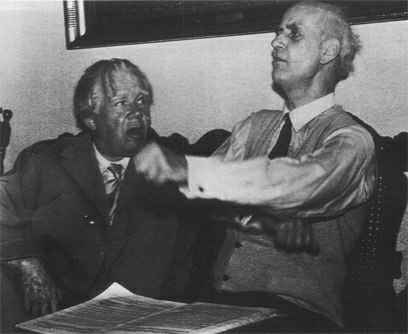
He moved near to lake Lucerne(Swiss) after his home was destroyed by the Allies air raid in 1942, and was naturalized to Swiss. He conducted at Lucerne Summer Festival from then on, but was tortured by chronic blood high pressure which had him give up concert appearance in 1955. He continued to teach at Lucerne Conservatory from time to time, but was almost pararalysed late several months. He passed away at a hospital in Zürich on 24th January 1960.
He was very good teacher. Demus, Badura-Skoda, Barenboim, and Brendel are among his pupils. Alfred Brendel recalls "Edwin Fischer preferred demonstration to explanation again and again he would sit down himself at the piano. Those were the greatest, the most unforgettable impressions retained by his students." Badura-Skoda said "All he did were creative. I feel his genuine talents not be eminent in concert... Too nervous, he once refused to give concert of his own." He was so nervous by stage freight when young. Judging from the articles I have, there were not many audiences that could hear him relaxed and he did not like studio recording because it demands high tension. But his music and recordings overcame the bad condition and survived against flooding of the new recordings from now on.
His recording repertoire is only confined to from German baroque to romantic(in my incomplete discography, only 11 composers including Furtwängler), but his concert repertoire was not so narrow - Debussy, Medtner, Hindemith, Reger, Scriabin, Stravinsky and Schönberg(6 Klavierstücke), and Chopin, etc. Medtner himself said that one of the best performances he had heard of his Piano Sonata in e minor was that by Fischer in Paris in 1920s. As long as we hear him by records, his technique is less than that of Backhaus, Horowitz, etc. But his characteristic tone is so profound and even mysterious that almost all of modern pianists cannot match him in the individuality. His sonority is very beautiful and soft at pp, and tough but never noisy or rough at ff . His ff sonority was often depicted as 'weighty thing on velvet'. Pianist Denis Mattews, who could join Fischer in a recording as a third solist of Concerto for three cembalos(EMI CDH 7 64928 2), wrote impressive material ; "benevolently leonine... had the softness and strength of a lion's velvet paws". He also liked to conduct, the recordings with his chamber orchestra and Philharmonia Orchestra shows his ambidexterity well. Elly Ney recalled a concert where she played solo of Brahms' Second Concerto and Fischer conducted. In his musical activity, piano solo was only one aspect and he was also good at chamber music(famous trio with Kulenkampf/Schneiderhan and Mainardi), and accompanist of lied.
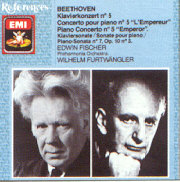 Most of his
recordings are at very high level. There are many items
in Références series of EMI, in which Bach recordings are
very good. The complete set of 'Das Wohltemperiete
Klavier'(EMI, 1933~36) is really historical, in the both
chronical aspect(the first complete recording) and
playing quality - especially on musical fluences and
supreme sonority with individuality. Other Bach
recordings are Brandenburg Concertos(No.2 & 5),
Cembalo concertos(No.1,2,4,5 & for 3 cembalos), and
minor pieces, which contains Chromatic fantasy and fugue,
Fantasies, Chorale Preludes, Toccata, etc(all
EMI). This recording shows wonderful(!!) tone color,
romantic interpretation, and decisive and persuasive
concept of the pieces.
Most of his
recordings are at very high level. There are many items
in Références series of EMI, in which Bach recordings are
very good. The complete set of 'Das Wohltemperiete
Klavier'(EMI, 1933~36) is really historical, in the both
chronical aspect(the first complete recording) and
playing quality - especially on musical fluences and
supreme sonority with individuality. Other Bach
recordings are Brandenburg Concertos(No.2 & 5),
Cembalo concertos(No.1,2,4,5 & for 3 cembalos), and
minor pieces, which contains Chromatic fantasy and fugue,
Fantasies, Chorale Preludes, Toccata, etc(all
EMI). This recording shows wonderful(!!) tone color,
romantic interpretation, and decisive and persuasive
concept of the pieces.
Mozart recordings are less famous - on
Mozart bicentennial year(1991), EMI released all of the
Mozart recordings of Fischer's as 3CD set(now deleted
from catalog), which comprised of 5 concertos, 2
sonatas(K.330 & 331), fantasie, etc.
Concerto No.24(K.491) conducted by Lawrence
Collingwood(later EMI producer of the monaural era,
especially for Furtwängler) has already acquired high
reputation.
The available recordings of Beethoven's
works are Concerto No.3~5 and Sonata No.7,8,23 &
31(EMI), in which 'Emperor' Concerto with Furtwängler has very
high reputation from now on. Music & Art released
live of Sonata No.7,8,14,15,21,30, & 32. Recordings
of Schubert's are Wanderer Fantasy, Musical moments,
Impromptus D.899 & 935, and Lied album of Schwarzopf
by accompanist. I cannot overpraise the beautiful
interpretation of Impromptus and lied album. Brahms'
Concerto No.2 with Furtwängler(live
in 1942) is more or less deficient in sound quality, but interesting in the point of hard-boiling
atmosphere. Other solo recordings are Schumann's Fantasy,
Brahms's Sonata No.3(EMI), Furtwängler's Concerto No.2(2nd movement), etc.
The duo with Gioconda de
Vito(Brahms' violin sonata
No.1 & 3; EMI) and the trio with Schneiderhan
and Mainardi are
major parts in his chamber music recordings, in which
Georg Kulenkampf originally played violin but
Schneiderhan succeeded his post after his death. The team
was one of the best piano trios in 20th century, whose
recordings remained only by live and broadcasting tape.
Music & Art released Beethoven's Ghost &
Archduke, Mozart's K.548, Schumann's No.1, and
Brahms' No.1 & 2. Badura-Skoda's recalling of a
concert in Salzburg(in 1950) alludes Fischer's instinct
to chamber music.
The master(Fischer) had suddenly fallen ill, and it was he himself who suggested that I substitute for him. On the basis of the impressions I had up to that time I threw myself with full force into the ff passages of the Brahms Trio on the program - after all that is how my master Edwin had done it. But after a few measures Enrico Mainardi interrupted me: "Young man, this is no piano concerto! If you play so loud, the strings won't be audible at all! A ff in a chamber music work is not the absolute but the relative volume of sound. What objectively corresponds to a mf may give the impression of the greatest power here, even if the piano is corresponding less loud and above all when an inner power of the soul comes to the fore."(from Music & Arts CD-739)
1) Miscellaneous photo (photo ; EMI)
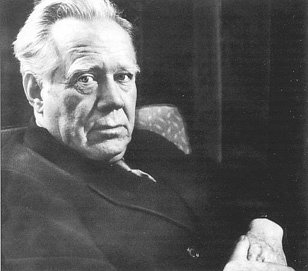 |
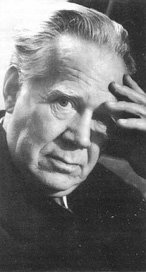 |
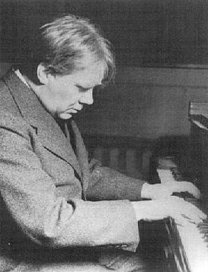 |
2) Trio with Wolfgang Schneiderhan and Enrico Mainardi
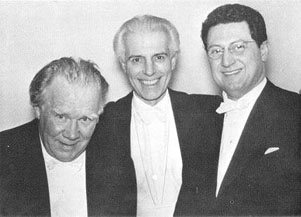 |
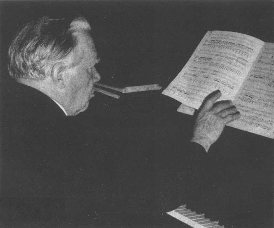 |
|
| (1) Photo from Music & Arts CD-739 | (2) In trio repertoire playing |
Photos from ;
- Young Fischer, In trio repertoire playing ; APR CD 5502
- with Wilhelm Furtwängler ; from Record Review, Apr. 1994
- Miscellous Photos ; EMI CDH 5 66085 2, Testament SBT 1024
- When I made this page, I
used an anecdote with Adolf Busch. "He once had dinner with
Adolf Busch at Basel(Swiss) in late 30s. Fischer
told him that he had many opportunities open to
him recently, which had Busch tell Fischer
quietly 'I think we had better not dinner
together again from now on.' Didn't
Fischer know the reason why he could have the new
opportunities in the Nazi regime and its real
meanings to the reluctant exiles such as Busch, Rudolf Serkin, Walter, and
Erich Kleiber? So,
too naive... (liner note by Teri Noel Towe in the
Koch CD 3-7701-2 H1)"
However, Mr. Roger Smithson - the maker of the Fischer discography here - let me know this is not plausible because Busch never considered Fischer and Furtwängler both very highly. Moreover Fischer's personality was never oppotunistic because he once took risk of saving Jewish musician. See this article.
(c) 1996~ , Youngrok LEE ; Link free, but please get my approval before you reuse, copy, or quote this materials.
Created ; 21st Jul. 2000
Last Update ; 24th Sep. 2010